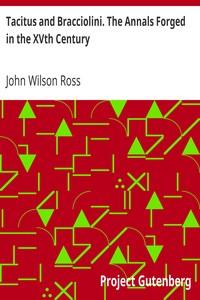Read this ebook for free! No credit card needed, absolutely nothing to pay.
Words: 34338 in 21 pages
This is an ebook sharing website. You can read the uploaded ebooks for free here. No credit cards needed, nothing to pay. If you want to own a digital copy of the ebook, or want to read offline with your favorite ebook-reader, then you can choose to buy and download the ebook.


: Reflections; or Sentences and Moral Maxims by La Rochefoucauld Fran Ois Duc De Friswell J Hain James Hain Translator Willis Bund J W John William Translator - Maxims
Preface Introduction Reflections and Moral Maxims First Supplement Second Supplement Third Supplement Reflections on Various Subjects Index
PREFACE
Some apology must be made for an attempt "to translate the untranslatable." Notwithstanding there are no less than eight English translations of La Rochefoucauld, hardly any are readable, none are free from faults, and all fail more or less to convey the author's meaning. Though so often translated, there is not a complete English edition of the Maxims and Reflections. All the translations are confined exclusively to the Maxims, none include the Reflections. This may be accounted for, from the fact that most of the translations are taken from the old editions of the Maxims, in which the Reflections do not appear. Until M. Suard devoted his attention to the text of Rochefoucauld, the various editions were but reprints of the preceding ones, without any regard to the alterations made by the author in the later editions published during his life-time. So much was this the case, that Maxims which had been rejected by Rochefoucauld in his last edition, were still retained in the body of the work. To give but one example, the celebrated Maxim as to the misfortunes of our friends, was omitted in the last edition of the book, published in Rochefoucauld's life-time, yet in every English edition this Maxim appears in the body of the work.
M. Aim? Martin in 1827 published an edition of the Maxims and Reflections which has ever since been the standard text of Rochefoucauld in France. The Maxims are printed from the edition of 1678, the last published during the author's life, and the last which received his corrections. To this edition were added two Supplements; the first containing the Maxims which had appeared in the editions of 1665, 1666, and 1675, and which were afterwards omitted; the second, some additional Maxims found among various of the author's manuscripts in the Royal Library at Paris. And a Series of Reflections which had been previously published in a work called "Receuil de pi?ces d'histoire et de litt?rature." Paris, 1731. They were first published with the Maxims in an edition by Gabriel Brotier.
The apology for the present edition of Rochefoucauld must therefore be twofold: firstly, that it is an attempt to give the public a complete English edition of Rochefoucauld's works as a moralist. The body of the work comprises the Maxims as the author finally left them, the first supplement, those published in former editions, and rejected by the author in the later; the second, the unpublished Maxims taken from the author's correspondence and manuscripts, and the third, the Maxims first published in 1692. While the Reflections, in which the thoughts in the Maxims are extended and elaborated, now appear in English for the first time. And secondly, that it is an attempt "to do the Duc de la Rochefoucauld the justice to make him speak English."
Introduction
The description of the "ancien regime" in France, "a despotism tempered by epigrams," like most epigrammatic sentences, contains some truth, with much fiction. The society of the last half of the seventeenth, and the whole of the eighteenth centuries, was doubtless greatly influenced by the precise and terse mode in which the popular writers of that date expressed their thoughts. To a people naturally inclined to think that every possible view, every conceivable argument, upon a question is included in a short aphorism, a shrug, and the word "voil?," truths expressed in condensed sentences must always have a peculiar charm. It is, perhaps, from this love of epigram, that we find so many eminent French writers of maxims. Pascal, De Retz, La Rochefoucauld, La Bruy?re, Montesquieu, and Vauvenargues, each contributed to the rich stock of French epigrams. No other country can show such a list of brilliant writers--in England certainly we cannot. Our most celebrated, Lord Bacon, has, by his other works, so surpassed his maxims, that their fame is, to a great measure, obscured. The only Englishman who could have rivalled La Rochefoucauld or La Bruy?re was the Earl of Chesterfield, and he only could have done so from his very intimate connexion with France; but unfortunately his brilliant genius was spent in the impossible task of trying to refine a boorish young Briton, in "cutting blocks with a razor."
This Francois, the second Duc de la Rochefoucauld, Prince de Marsillac, the author of the maxims, was one of the most illustrious members of the most illustrious families among the French noblesse. Descended from the ancient Dukes of Guienne, the founder of the Family Fulk or Foucauld, a younger branch of the House of Lusignan, was at the commencement of the eleventh century the Seigneur of a small town, La Roche, in the Angounois. Our chief knowledge of this feudal lord is drawn from the monkish chronicles. As the benefactor of the various abbeys and monasteries in his province, he is naturally spoken of by them in terms of eulogy, and in the charter of one of the abbeys of Angouleme he is called, "vir nobilissimus Fulcaldus." His territorial power enabled him to adopt what was then, as is still in Scotland, a common custom, to prefix the name of his estate to his surname, and thus to create and transmit to his descendants the illustrious surname of La Rochefoucauld.
The third count, after serving with distinction under the Duke of Guise against the Spaniards, was made prisoner at St. Quintin, and only regained his liberty to fall a victim to the "bloody infamy" of St. Bartholomew. His son, the fourth count, saved with difficulty from that massacre, after serving with distinction in the religious wars, was taken prisoner in a skirmish at St. Yriex la Perche, and murdered by the Leaguers in cold blood.
The sixth duke, the friend of Condorcet, was the last of the long line of noble lords who bore that distinguished name. In those terrible days of September, 1792, when the French people were proclaiming universal humanity, the duke was seized as an aristocrat by the mob at Gisors and put to death behind his own carriage, in which sat his mother and his wife, at the very place where, some six centuries previously, his ancestor had been taken prisoner in a fair fight. A modern writer has spoken of this murder "as an admirable reprisal upon the grandson for the writings and conduct of the grandfather." But M. Sainte Beuve observes as to this, he can see nothing admirable in the death of the duke, and if it proves anything, it is only that the grandfather was not so wrong in his judgment of men as is usually supposed.
Francis, the author, was born on the 15th December 1615. M. Sainte Beuve divides his life into four periods, first, from his birth till he was thirty-five, when he became mixed up in the war of the Fronde; the second period, during the progress of that war; the third, the twelve years that followed, while he recovered from his wounds, and wrote his maxims during his retirement from society; and the last from that time till his death.
In the same way that Herodotus calls each book of his history by the name of one of the muses, so each of these four periods of La Rochefoucauld's life may be associated with the name of a woman who was for the time his ruling passion. These four ladies are the Duchesse de Chevreuse, the Duchesse de Longueville, Madame de Sabl?, and Madame de La Fayette.
Free books android app tbrJar TBR JAR Read Free books online gutenberg
More posts by @FreeBooks

: Tacitus and Bracciolini. The Annals Forged in the XVth Century by Ross John Wilson - Tacitus Cornelius. Annales; Bracciolini Poggio 1380-1459; Literary forgeries and mystifications History To 1500; Rome History Julio-Claudians 30 B.C.-68 A.D. Historiograph


: Robert's Rules of Order Pocket Manual of Rules of Order for Deliberative Assemblies by Robert Henry M Henry Martyn - Parliamentary practice Reference






